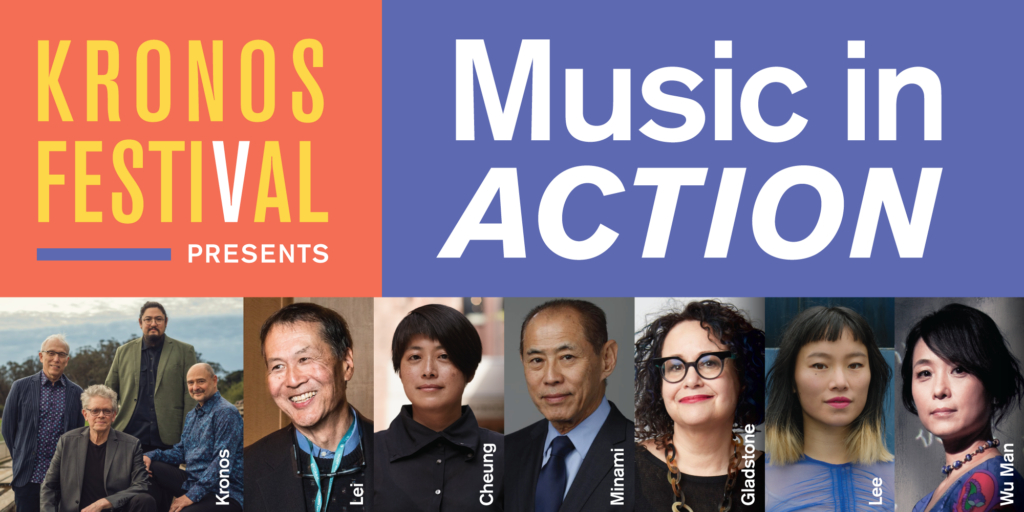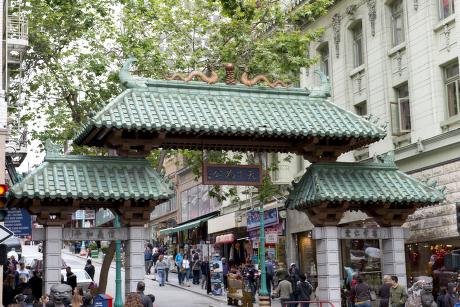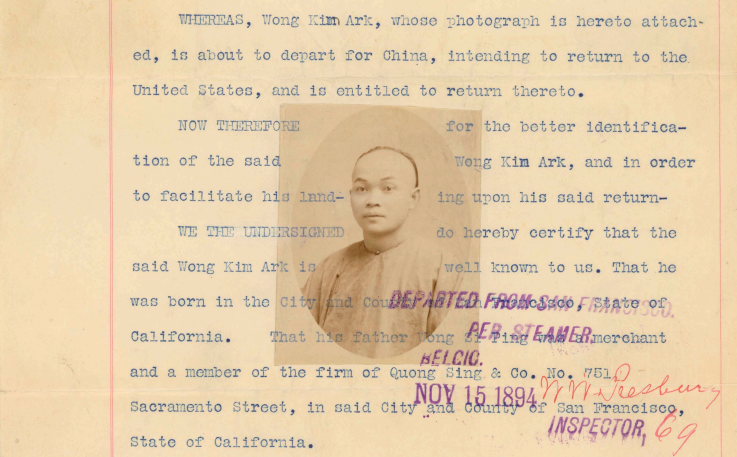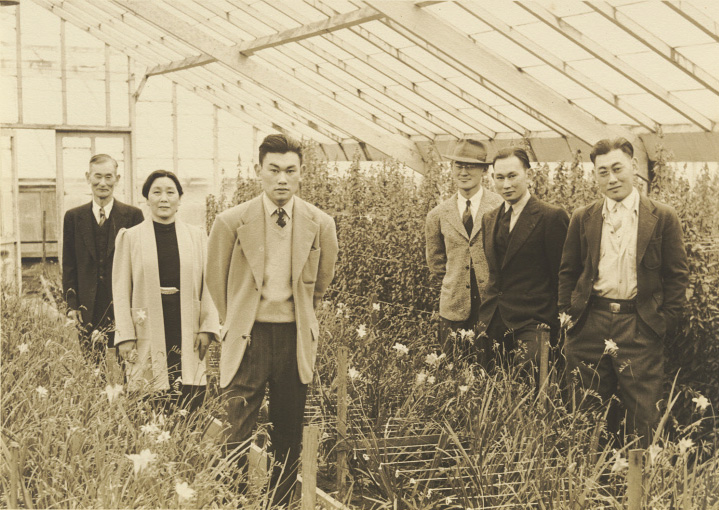David Harrington discusses how Kronos combines live music with onstage conversation in two innovative Kronos Festival programs, June 20 & 21.
By Matthew J. Campbell

Ever since its founding inspiration in George Crumb’s Vietnam War–themed work Black Angels (1970), Kronos Quartet has had activism in the name of social justice at its core. Likewise, the quartet has long explored the marriage of instrumental music and pre-recorded spoken word, in works ranging from Steve Reich’s iconic, Holocaust-inspired Different Trains (1988) to Zachary James Watkins’ more recent Peace Be Till (2018), featuring excerpts of Dr. Martin Luther King, Jr.’s “Letter from Birmingham Jail” read by Dr. King’s speechwriter and confidant Dr. Clarence B. Jones.
Now, the first two evenings of this year’s Kronos Festival in San Francisco bring these two long-standing Kronos passions together, with a novel twist: live music by Kronos paired with unscripted, onstage conversations focused on historic struggles for social justice within the cultures and courtrooms of San Francisco. Program 1 on Thursday, June 20 includes the world premiere of Beyond the Golden Gate, an innovative, multimedia exploration of how Chinese Americans have harnessed the US legal system to define and expand civil and immigrant rights in America. Program 2 on Friday, June 21 features the world premiere of Active Radio, exploring the Supreme Court decision upholding the internment of Japanese Americans in World War II—the misconduct that led to it, the efforts involved in its overturning, and the continuing relevance it has to justice efforts around the world.
For a deeper dive into the impetus behind these new works, Kronos News caught up with Kronos founder and Artistic Director David Harrington.

Q: How did this idea of blending music and conversation on stage first come to you?
David Harrington: It goes way back to 2003. David Barsamian, the founder and leader of Alternative Radio, had introduced me to [historian and activist] Howard Zinn, whom David had interviewed many times. I ended up in Howard’s office [for a conversation], and he was so amazingly helpful to me. And I thought, “I want to share this experience with our audience.” And another thing: if you listen to Alternative Radio, they use Kronos music as their theme music—Mai Nozipo [by Dumisani Maraire, from the 1992 album Pieces of Africa]. Everything led to, “Let’s try to do something like this live.” So that’s what we did, at Zankel Hall, in 2006: Howard Zinn, Alternative Radio, Kronos. We played two one-hour live radio shows. And later we did that in Vienna, Austria, as well. And it was incredibly beautiful and satisfying, and it felt like our audience was getting the news—they were getting the real news.
Q: So with that format in mind, how did you decide upon the particular historical topics of conversation to explore in the upcoming Kronos Festival?
DH: It occurred to me that there are events that have happened in San Francisco, right where we live, right where members of our audience live, that many of us don’t even know about. And I found out about them from my daughter Bonnie, who was a third-grade teacher. One day, she handed me one of her class books and said, “Dad you’ve got to read this book.” And it was about Wong Kim Ark and his court case [Editor’s note: an important 1898 Supreme Court Decision confirming birthright citizenship for Chinese Americans]. I had never heard about Wong Kim Ark, and by the time I finished reading this book, I thought, “How come I didn’t know about this case?” So that was the seed that got planted for me. And actually, the very same thing happened with the Fred Korematsu case [Editor’s note: the 1944 Supreme Court decision upholding the internment of Japanese Americans during World War II—overturned in 1983 thanks to the efforts of San Francisco lawyer (and Kronos Festival guest speaker) Dale Minami and his team.
So the idea that adults can get important information from third-grade books is at the heart of this. And the idea of bringing conversation about topics that all of us can learn from and can strengthen our knowledge of our own society—that’s what has led to these two closing parts of our first two concerts.

Q: Let’s dig into the details of the Festival programs, starting with Beyond the Golden Gate in Program 1 on Thursday, June 20. Please talk a bit about the mix of artistry and activism that you’ve put together.
DH: Our work with [pipa virtuoso] Wu Man goes back to the early ’90s. And it was about that time that I learned of the Edison cylinder recordings that were made in San Francisco’s Chinatown in 1902. For a long time, I had been talking to Wu Man about somehow using those recordings as the basis of a piece that we would do together. So [in Beyond the Golden Gate], Dai Wei, the young composer, has used those recordings in a new piece, which will be part of an improvised set that Kronos and Wu Man will perform under a conversation between [SF-based community activist] David Lei and [Cantonese Australian vocalist] Charmaine Lee.
They’re going to be talking about some very important, critical legal cases that were brought by Chinese Americans and that influenced our legal system. And the idea that our music can exist as a counterpoint to a conversation about our legal system in a “live radio” format—that is what we’re going to be doing. David Lei is a pre-eminent activist/historian of the San Francisco Chinese community, and Charmaine Lee is someone I’ve wanted to work with since before the pandemic. About a month and a half ago, I was meeting with her, and I started telling her about what I had in mind for June 20, and the look on her face—it’s like her eyes just got wider and wider, and by the time I finished the story of Wong Kim Ark, she told me, “My great-great-grandfather, Look Tin Sing, had exactly the same story, and he also encountered the American legal system. He was an American citizen, had a passport, went to China, and they wouldn’t let him back in. Same thing that happened to Wong Kim Ark. And he sued the U.S. government, like Wong Kim Ark did later. And they both won their cases.” And David Lei is going to explain the importance of these cases, and he’s going to connect Look Tin Sing with the foundation of San Francisco’s Chinatown.
Q: Is Charmaine Lee just going to be talking with David Lei, or is she going to perform as an artist as well?
DH: She will be in conversation with David, and at the very end, she’s going to join Kronos in performance. But everything on the stage is going to be evolving, including Charmaine’s role.
Q: You just touched on one of my upcoming questions. I was thinking that if the music were all through-composed, you’d lose an element of spontaneity that you might want in this context. So you’re improvising on some level, responding to what’s being said?
DH: The thing we couldn’t do all those years ago with Howard Zinn—we couldn’t make on-the-spot decisions. We had to plan the music before we knew what the conversation was going to be. It worked out really great, I have to say. But what’s going to be really wonderful now, I believe, is with the iPads we have, we will be able to decide on the spot, “OK, from Dai Wei’s piece, maybe the next piece should be something that Wu Man wrote. Maybe it should be Long-Ge, which Jack Body arranged for Kronos 37 years ago.” We will make those decisions on the stage, on the spot.
Q: How are you going to cue them? Will you have hand signals or cue cards, like with John Zorn game pieces?
DH: [laughs] That’s what our rehearsal is going to tell us! There are a lot of ways to try it. And I think there’s a way it can be done on the screen of the iPad.

Q: Let’s move on to Program 2 on June 21. Could you talk about the special mix that’s gone into Active Radio?
DH: Brooke Gladstone has been a friend of mine for 35 years. For On the Media, her program on WNYC in New York, she regularly uses Kronos’ music. And we’re continually talking about various aspects of music and life. I’ve done a number of public interviews with Brooke, and she’s just wonderful. Last year, we did a concert for the 25th anniversary of the Center for Justice and Accountability, and that’s where we met their executive director Carmen Cheung. Dale Minami was to have received an award that night, only he was ill. So Carmen spoke about what Dale had done in terms of the Fred Korematsu case, and I thought, “I need to meet Dale. He lives in San Francisco. The fact that Dale was able to get that horrible Supreme Court decision of 1944 overturned in 1983—I need to meet this man. I just have to!” And so I met him, and I was so impressed, first of all, with how he always talks about “we.” It’s not “I did this”—it’s “we did this.” And he’s very gentle. I bet he would be incredibly firm as well, as lawyer. But when you’re talking to him, he’s very generous, and gentle. And I thought, “I want our audience to know not only about the case, but about this person.” And so that’s right at the heart of why we’re doing this. And when I think about the Korematsu decision and then the overturning of it, I just know there are many other ways in the future that Kronos can celebrate important events that have happened right in our community. When you realize that events like this happened right where we live, I think it gives you more of a sense of place. And it’s important that we know these cases. To me, it’s very musical.
Q: On that “musical” note: I don’t believe you’ve yet shared what the music is going to be for Active Radio. Do you have a constellation of pieces you might select from, and will it be the same kind of format as Beyond the Golden Gate, where you’ll be cueing the works live as the conversation goes on?
DH: First of all, Paul Wiancko wrote a marvelous piece called American Haiku, originally for viola and cello, and he’s made a version for Kronos. That will be the theme music, and it will be the outro music. Between those two moments, we will use music of Terry Riley. And it will be very spare and quiet. We’ll use music of Laurie Anderson, her composition Flow. The very opening of John Oswald’s Spectre, where we’re tuning up, and it’s just getting louder and louder—we’re going to use part of that. And again, that will be decided pretty much on the spot.
Q: What you’re saying about music that’s “spare and quiet” makes good sense to me. Obviously, you can’t be playing Black Angels over a conversation.
DH: [laughs] Well, you might be able to play parts of it, very softly. But, yes, exactly.
Matthew J. Campbell is a Virginia-based writer and consultant and a former Kronos Performing Arts Association Strategic Initiatives Director.
Kronos Festival takes place June 20-23 at SFJAZZ Center in San Francisco. Complete program and ticket information below.
Kronos Festival is produced by the Kronos Performing Arts Association (KPAA) and is part of the San Francisco–based 501(c)3 nonprofit’s KRONOS PRESENTS program. It is made possible by support from San Francisco Grants for the Arts, National Endowment for the Arts, Barbro Osher Pro Suecia Foundation, William and Flora Hewlett Foundation, and Bernard Osher Foundation.



